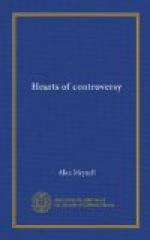Emily Bronte seems to have a nearly unparalleled unconsciousness of the delays, the charms, the pauses and preparations of imagery. Her strength does not dally with the parenthesis, and her simplicity is ignorant of those rites. Her lesser work, therefore, is plain narrative, and her greater work is no more. On the hither side—the daily side—of imagery she is still a strong and solitary writer; on the yonder side she has written some of the most mysterious passages in all plain prose. And with what direct and incommunicable art! “‘Let me alone, let me alone,’ said Catherine. ’If I’ve done wrong, I’m dying for it. You left me too . . . I forgive you. Forgive me!’ ’It is hard to forgive, and to look at those eyes and feel those wasted hands,’ he answered. ’Kiss me again, and don’t let me see your eyes! I forgive what you have done to me. I love my murderer—but yours! How can I?’ They were silent, their faces hid against each other, and washed by each other’s tears.” “So much the worse for me that I am strong,” cries Heathcliff in the same scene. “Do I want to live? What kind of living will it be when you—Oh God, would you like to live with your soul in the grave?”
Charlotte Bronte’s noblest passages are her own speech or the speech of one like herself acting the central part in the dreams and dramas of emotion that she had kept from her girlhood—the unavowed custom of the ordinary girl by her so splendidly avowed in a confidence that comprised the world. Emily had no such confessions to publish. She contrived—but the word does not befit her singular spirit of liberty, that knew nothing of stealth—to remove herself from the world; as her person left no pen-portrait, so her “I” is not heard here. She lends her voice in disguise to her men and women; the first narrator of her great romance is a young man, the second a servant woman; this one or that among the actors takes up the story, and her great words sound at times in paltry mouths. It is then that for a moment her reader seems about to come into her immediate presence, but by a fiction she denies herself to him. To a somewhat trivial girl (or a girl who would be trivial in any other book, but Emily Bronte seems unable to create anything consistently meagre)—to Isabella Linton she commits one of her most memorable passages, and one which has the rare image, one of a terrifying little company of visions amid terrifying facts: “His attention was roused, I saw, for his eyes rained down tears among the ashes. . . The clouded windows of hell flashed for a moment towards me; the fiend which usually looked out was so dimmed and drowned.” But in Heathcliff’s own speech there is no veil or circumstance. “I’m too happy; and yet I’m not happy enough. My soul’s bliss kills my body, but does not satisfy itself.” “I have to remind myself to breathe, and almost to remind my heart to beat.” “Being alone, and conscious two yards of loose earth was




